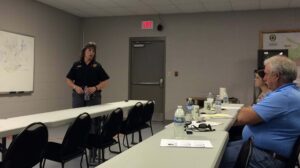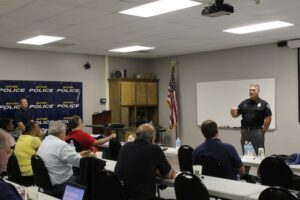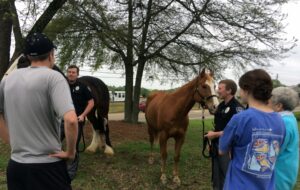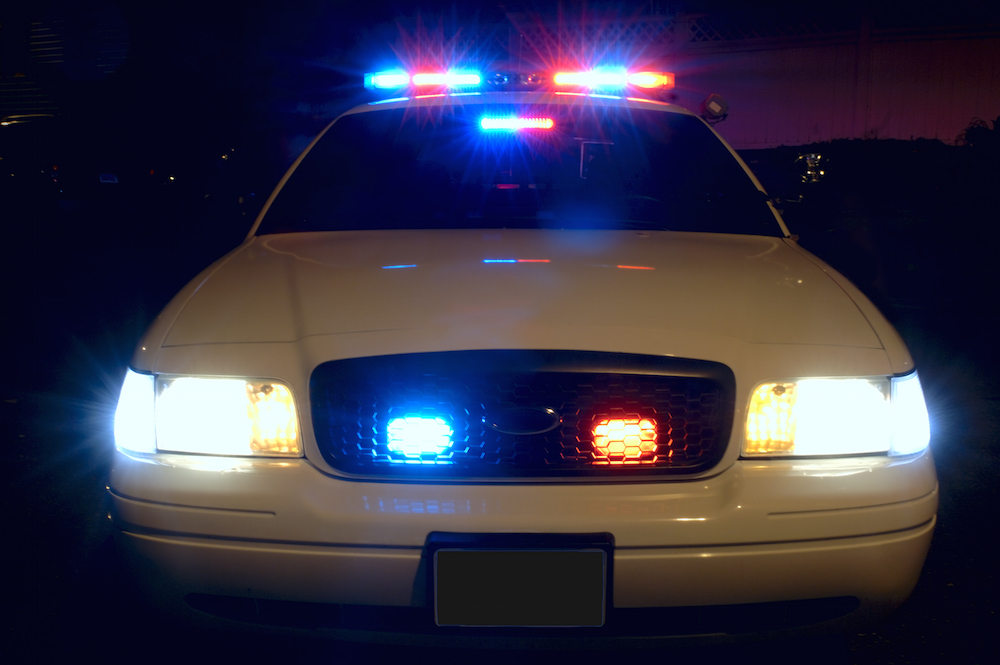There are rising tensions in cities between citizens and police officers, even in Oxford at times if one judges the sour comments on DUI checkpoints around town. Yet the Oxford Citizen Police Academy is a way for Oxford citizens to understand the full extent of the police officers’ actions.
I enrolled in Oxford Citizen Police Academy (CPA) at the beginning of the year, and I had only an idea of what to expect: some lectures, a defensive driving course and an afternoon on their practice shooting range. What I knew was the official statement concerning CPA, issued by the Oxford police department on the first day of class:
“The Oxford police department (OPD) wants to strengthen the common bond of trust and understanding between the department and the citizens it serves by exposing the community to a program where they can experience first-hand the many areas of police training. In the past, many members of the community have utilized television and movies to describe the role of the police. This has lead to distorted images and unrealistic expectations of the police. By sharing the methods of how and why officers are trained the way they are, many myths and misunderstandings can be dispelled.
“The development of the Citizens Police Academy has resulted in a new mechanism for improving police-community relations and enhancing public cooperation. Over time, the program has identified several recurring themes: an increased understanding of and appreciation and support for the intelligence, versatility and professionalism of the average police officer; an increased appreciation and support for the continued training and formal education for police; a decided willingness to be less influenced by the prejudices of others in conversations related to the police; and an increased sense of individual responsibility to work with the police in matters related to order, maintenance and crime prevention.”
The first class began March 23, a Tuesday night, with a tour of the police station by Deputy Chief James Owens. Owens took the class around the building, showing us each room. One stuck out in particular: the video surveillance room.
All those cameras on the street lights? Yep, those aren’t fake cameras as a deterrent for yellow-light to red-light runners – they’re real, and the police officers do see y’all running lights.
That same night the retired Assistant Chief H.C. Franklin, who served in Oxford police department from July, 1962 to April 1, 1989, regaled the class with the history of Oxford police. He took us to a time when Oxford police station was on 9th Street behind the old City Hall building where officers’ starting salary were $275 a month and they worked six days a week. Police officers furnished their own guns and sent prisoners to jail in Batesville. There were six police officers total and two patrol cars and their dispatcher worked out of the University of Mississippi’s power plant.
Oxford has come a long way since its current station was built in 1982. Owens said, “We expect to grow even more.” He mentioned needing 20 to 25 patrol cars at night to deter criminal behavior.

Captain Libby Lytle led next week’s class on Monday, March 30, where she taught criminal law to show decisions police officers make in accordance with not only the U.S. Constitution but also the Mississippi Constitution and the Mississippi Police Accreditation as well as Oxford police department’s policies and procedures.
She explained scenarios and the appropriate response for the police officers are expected to follow to ensure safety for themselves and other civilians while respecting public rights. One scenario stood out to me because this scenario happened weeks later in Baltimore that resulted in Freddie Gray’s death.
On the topic of pursuits, Captain Lytle said to the class, “Let’s imagine I’m at High Pointe in my uniform. I start the morning with a great cup of coffee, and I’m walking out of the cafe where I make eye contact with a person. This person’s eyes get huge and he runs away! But I haven’t any idea why he ran – I’m just standing there with my coffee. Now, what do I do in that situation?”
Some of my classmates thought it was okay to pursue that person, especially if he recently committed a crime. Captain Lytle said no, there was nothing she could do unless she gets a dispatch with the description of a suspect matching the fleeing person. She said to the class that until then that fleeing man was within his rights to run. I had trusted Oxford police, but that night deepened my trust with the force. I felt the police officers care about citizens’ public rights and welfare despite working under tremendous stress that could jade many towards humanity.

On April 7, another Tuesday night, Detective Donovan Lyons, a 22-year veteran police officer who came to Oxford from Los Angeles and is the training director at OPD, taught our class about traffic stops. He showed a video of late deputy Kyle Dinkheller who was shot during a traffic stop near Dudley, Georgia on January 12, 1998. Detective Lyons says he uses that video as part of training in what not to do, and he said that traffic stops are a safety concern to police officers.
He said that it takes just a few seconds for a traffic stop to go one way or another, few seconds too short for an officer to react if standing near the driver’s window. He explains this is why police officers approach cars with a hand on their gun.
“Traffic stops are dangerous,” he said, “The Oxford cop is disadvantaged and doesn’t know what the driver may be like. We’re behind on a reactionary shot, a half second of life or death situation.”
Detective Lyons then demonstrated with demo traffic stops just outside of the classroom right by the police station. He instructed some of my classmates to conduct a traffic stop by stepping out of the patrol car and walking in a safest possible manner to the pulled-over vehicle. The vehicle’s windows were tinted so dark it was nearly impossible to see what the driver, impersonated by an Oxford police officer, was doing in the front seat. The first classmate walked up to him without a cautious thought – he thought he was going through the motions such as asking him for his license and registration when suddenly the driver pulled a small gun on him. Our class was startled by the popping noise emanating from the small air pistol.
Detective Lyons nodded grimly and he said, “We want to go home like y’all.”
One of his statements stood to me during the lecture: “Why haven’t many people asked us how our day was going when we pull over people? All too often we’ll walk up and not even get a hello.” I had thought of these pullovers from my perspective. They’re annoying but no matter how I keep from voicing my annoyance, I could be friendlier. From his point of view, I’m one of many irate drivers and after a while I’m sure that collective attitude could wear away at anybody’s upbeat attitude during their jobs over time.
Owens spoke up during this lecture. He said, “That’s why we started this academy. We wanted to reach out to people and help them understand and see the stress of the job.”
The police department does work towards connecting to the community. In the next class, April 13, we met Officer David Misenhelter of the Oxford Police Mounted Patrol. Misenhelter said the mounted patrol help with how the community interact with the police. I knew Misenhelter from nearly a year ago when one of first stories I wrote for this site was a feature of the Friends of the Mounted Patrol to help the patrol raise money to further their mission of aiding the public in a personable way while still managing drunken crowds in the Square.

It was that night too that Major McCutchen talked to the class about the SWAT demo. Double Decker Festival was coming up, and McCutchen said that the SWAT team would be patrolling to ensure everyone’s safety. He said that night that the public safety matters above all to the SWAT team, no matter how dire the situation is.
Later that night after class I said to my fiance that I trusted Oxford police like never before. I had to miss the driving course on April 18, but I did attend the firearms class led by Captain Philip Zampella on May 16, an early Saturday morning. That same morning my class received certificates of completion, and we were all appreciative of the certificate and the Oxford police

Zampella then led us through proper firearm behavior from trigger control to holding the guns correctly. Zampella said that gun shooting wasn’t anything like in Hollywood; he said that going through the Hollywood motions in pursuit of a fleeing subject within a building could result in a perpetrator grabbing the gun easily. He answered many of our questions, and I couldn’t help but ask the police procedure on fleeing people after traffic stops.
Zampella said, “If a person starts running away from me during a traffic stop, and I don’t see any weapons in hand or in pants waistband – well, I just chase him then. If they do have a weapon, it’s clear to me they’re willing to use it. I have to use my gun if necessary because that person could hurt others in public.”
He then commented on the South Carolina police officer Michael Slager shooting Walter Scott, saying it was wrong of the officer to do so. Zampella has made clear that firearms, while necessary for safety, are to be used only when the police officer’s life or the public safety are at immense risk of harm.
We then went to the police shooting range off Highway 7 to put the gun class to practice. My classmates and I were a little nervous at first, but Zampella was so thorough in the lesson that we felt confident in shooting the target range. An hour or so went by and my hands were sore but I knew that at the class’ end that my attitude towards police had changed significantly.
There are problems with the police in America that I am well aware of, and I do feel that the Oxford Citizens Academy benefits the police as much as it benefits us. We’re able to build trust and rapport with each other, and the community could easily talk to the Oxford police and hash out issues with them. I can only express these opinions by my experience in the Oxford Citizen Police Academy but I do know that at its end I appreciated them more for their service and their willingness to answer hard questions and face issues between police and the citizens in America.
Correction: Oxford police cannot electronically ticket people since such activity is outlawed.
Callie Daniels is a staff reporter and writer for HottyToddy.com. She can be reached at callie.daniels@hottytoddy.com.

Recent Comments